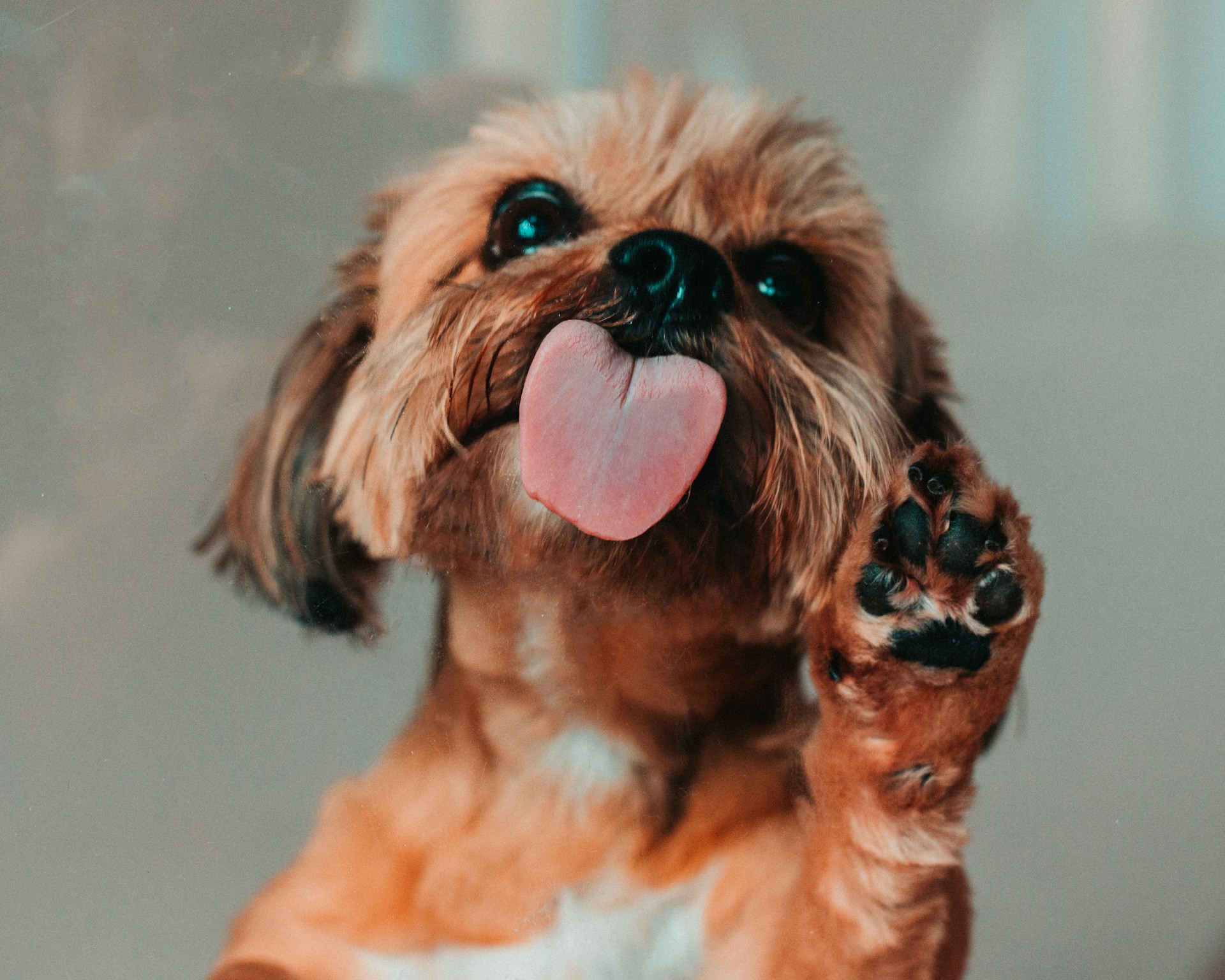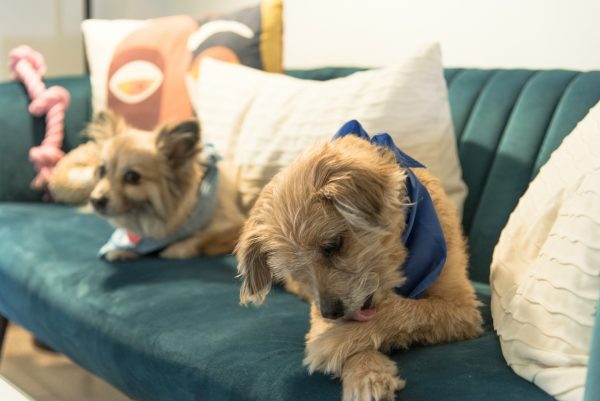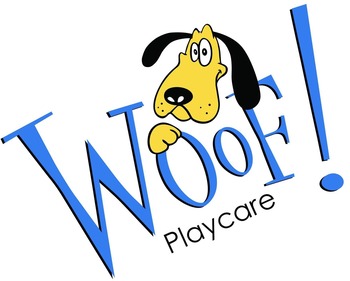
Why Do Dogs Lick Their Paws
Have you ever noticed your dog licking their paws a lot and wondered why they do it? A little licking now and then is normal—dogs groom themselves just like cats do. But if your dog is licking their paws all the time, it could mean something’s wrong. It might be because of allergies, stress, boredom, infections, or even a small injury.
Injuries, Cuts, and Scrapes
Sometimes dogs lick their paws because they have a small injury, like a cut, scrape, or even something stuck between their toes. Just like people might touch or look at a sore spot, dogs use their mouths to check out what’s wrong. Licking can help clean the area, but too much licking might actually make it worse by causing more irritation or infection. If your dog keeps licking the same spot, it’s a good idea to gently check their paw for anything unusual, like redness, swelling, or a stuck object. If your dog is limping, yelping, or you feel heat or swelling you should contact your vet for an evaluation. Otherwise you can gently clean the area and monitor. If the licking persists after at-home remedies, you should seek veterinary attention.
Fleas and Ticks On Dogs Paws
Another reason your dog may be licking their paws is due to fleas or ticks. These bugs can bite and cause a lot of itching and pain, especially around the paws where dogs often pick them up from grass or dirt. When a dog licks or chews at their paws a lot, it could be their way of trying to relieve the itch or get rid of the bugs. You might also notice redness, hair loss, or small bumps in the area. It’s always a good idea to check your dog’s paws for fleas and ticks periodically after coming indoors. If you live in a region where fleas and ticks are prevalent, then it would be a good idea to check their paws more frequently. Your dog may be licking their paws because the flea or tick can embed itself in between their toes and cause a lot of discomfort. Fleas can sometimes lead to a condition called flea allergy dermatitis, which makes the itching even worse and can cause secondary skin infections. Ticks, on the other hand, can transmit diseases like Lyme disease, which can affect your dog’s overall health. If you think your dog may be licking its paws due to fleas or ticks, you should contact your vet for proper removal and treatment. Your vet can recommend flea and tick preventatives, such as topical treatments, oral medications, or collars, to help protect your dog from future infestations. Regular grooming and keeping your dog on a consistent flea and tick prevention routine can also help minimize the risk of these pests, making your dog more comfortable and preventing the need for constant licking.

Paw Allergies
If you’ve checked your dog’s paws for cuts, scrapes, stuck items, and fleas or ticks then your dog may be licking their paws due to allergies. Many dogs lick their paws due to environmental allergies. Just like how humans get a runny nose or itchy eyes when they have allergies, your dog may be licking their paws because of pollen or grass. Some dogs lick or chew their paws until they bleed or are raw. This can cause pain and sometimes infection if left untreated. If you suspect your pet may have environmental allergies you could wipe their paws when they come indoors. If you are unsure if your pet is suffering from environmental allergies, you can always have your vet evaluate them. Another type of allergen could be causing your dog to lick their paws-food allergies. Dogs can be allergic to ingredients like chicken, beef, dairy, or grains. If you think your dog might have a food allergy, a vet can help by suggesting a special diet to figure out what’s causing the issue.
Anxiety and Boredom
Sometimes, dogs start licking their paws not because of a physical issue, but because they’re feeling bored or anxious. Just like people might bite their nails or fidget when they’re stressed, dogs may turn to licking their paws as a way to cope with their emotions. This kind of repetitive behavior can become a habit if the dog doesn’t have enough mental stimulation or if they’re left alone for long periods. To help with boredom, try giving your dog more interactive toys, puzzle feeders, or extra playtime during the day. For anxiety, calming routines, regular exercise, and even training sessions can help your dog feel more secure. You may even choose to enroll your pet in dog daycare to release some energy while you’re away from home. In some cases, working with a vet or dog behaviorist can be helpful to find the best solution.
Dry and Irritated Paws
Dry or irritated skin is another reason dogs may start licking their paws. This can happen for several reasons, including cold weather, low humidity, harsh shampoos, or exposure to chemicals like salt or cleaners on sidewalks. When a dog’s skin gets dry, it can become itchy and uncomfortable, causing them to lick in an attempt to soothe the irritation. While a little licking might help them feel better, too much can damage the skin and make things worse. To help prevent dry skin, make sure your dog is bathed with a gentle, moisturizing shampoo made for pets, and consider using a paw balm or moisturizer. Each breed has a different coat as well, ask your vet for recommendations based on the breed of dog you have. Keeping your home humid during the winter and wiping your dog’s paws after walks can also reduce dryness. Another solution may be to take your pet to a groomer who is trained in properly cleaning and drying your dog’s coat. If the problem doesn’t go away, it’s a good idea to check with your vet as they may need a medicated wash or other treatment.
Infections In Dogs’ Paws
Infections are another common reason dogs may lick their paws. When a dog has a bacterial or fungal infection, it can make their paws itchy, sore, and inflamed. These infections can develop after a small cut or scrape gets dirty or when bacteria or fungi enter the skin. Dogs will often lick the area in an attempt to relieve the irritation, but this can sometimes make the infection worse. Fungal infections, like yeast infections, are common in the paws, especially in dogs with thick fur or those who have been walking in damp conditions. Bacterial infections can occur when a dog licks a wound or breaks the skin, creating an opening for bacteria to get in. If the infection isn’t treated, it can cause swelling, redness, and even pus, making your dog more uncomfortable.
To prevent these infections and your dog from licking their paws, it’s important to check your pets paws regularly for signs of injury or irritation. If you notice a cut, scrape, or swollen area, gently clean it with warm water and mild soap, and make sure to dry the paw thoroughly. If the infection seems to be getting worse, or if your dog continues to lick the paw despite cleaning it, you should take them to the vet. A vet can diagnose whether it’s a bacterial or fungal infection and recommend the proper treatment, such as antibiotics or antifungal creams. In some cases, oral medication might be needed. It’s also a good idea to prevent your dog from licking the area too much by using an Elizabethan collar or a protective boot until the infection heals. Keeping your dog’s paws clean and dry, especially after walks, can also help prevent infections from developing in the first place.
FAQ for Dog Paws:
- Is it normal for dogs to lick their paws?
Yes, occasional paw licking is normal. Dogs lick their paws as part of their grooming routine. However, excessive licking may signal a problem, and it’s worth keeping an eye on. - What are the common reasons dogs lick their paws?
Dogs lick their paws for various reasons, including injuries, allergies (both environmental and food-related), flea or tick infestations, dry or irritated skin, boredom, anxiety, or even as a habit. - How can I tell if my dog’s paw licking is due to an injury?
If your dog is licking one specific paw and you notice redness, swelling, or any visible cuts or foreign objects, it’s likely due to an injury. Check their paws regularly for signs of injury, and if the licking continues, it might be best to visit your vet. - Can allergies cause my dog to lick their paws?
Yes, allergies are a common cause. Dogs can develop allergies to things like pollen, certain foods, or chemicals in cleaning products. If you suspect allergies, look for signs like sneezing, ear scratching, or skin redness, and consult your vet for guidance. - How do I stop my dog from licking their paws due to boredom or anxiety?
For boredom, provide more mental and physical stimulation, such as interactive toys, puzzles, or longer walks. For anxiety, try calming routines, extra exercise, and behavior training. If the licking continues, a vet or behaviorist can help create a plan to address the issue.

